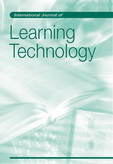
International Journal of Learning Technology
Scope & Guideline
Advancing Knowledge at the Intersection of Learning and Technology.
Introduction
Aims and Scopes
- Educational Technology Integration:
The journal explores how technology can be effectively integrated into educational practices to enhance learning outcomes. This includes research on learning management systems, mobile learning, and the use of immersive technologies. - Student Engagement and Experience:
A significant focus is on understanding factors that influence student engagement and satisfaction in online and blended learning environments. This includes studies on self-efficacy, motivation, and the user experience with learning technologies. - Adaptive and Personalized Learning:
The journal emphasizes research on adaptive learning technologies and personalized instructional approaches, which cater to diverse learner needs and promote self-regulated learning. - Impact of COVID-19 on Education:
There is a consistent focus on the implications of the COVID-19 pandemic for educational practices, including the transition to online learning, challenges faced by educators and students, and innovative solutions developed in response. - Pedagogical Strategies and Innovations:
Research on innovative pedagogical approaches, such as flipped classrooms, blended learning, and collaborative learning, is a core area of interest, examining their effectiveness in various educational settings. - Assessment and Evaluation in Learning:
The journal addresses issues related to assessment methods, including the evolution of technology-based assessment and challenges in distance assessment, providing insights into best practices and frameworks.
Trending and Emerging
- Emotional and Psychological Factors in Learning:
There is a growing emphasis on understanding how emotional and psychological factors, such as anxiety, motivation, and stress, influence learning outcomes and technology acceptance among students and educators. - Social Justice and Equity in Education:
Recent publications highlight the importance of social justice and equity in educational technology, with research focusing on culturally relevant teaching practices and the experiences of diverse learner populations. - Technological Pedagogical Content Knowledge (TPACK):
The integration of TPACK as a framework for understanding teachers' knowledge and skills in using technology for pedagogy has gained prominence, particularly in relation to teacher training and professional development. - Data-Driven Decision Making in Education:
Emerging themes include the use of data analytics and machine learning techniques to inform educational practices, such as predicting student engagement and understanding learning behavior. - Remote and Hybrid Learning Innovations:
Given the impact of the COVID-19 pandemic, there is a significant trend towards exploring innovations in remote and hybrid learning, including the effectiveness of various teaching methods and technologies in these contexts.
Declining or Waning
- Traditional Learning Theories:
There has been a noticeable decrease in publications focusing on traditional learning theories without the integration of technology. The shift towards more technology-driven pedagogical frameworks reflects a broader trend in educational research. - General EdTech Innovations:
Research that broadly covers educational technologies without a specific focus on their application or impact has seen a decline. The journal now favors studies that provide empirical evidence or case studies demonstrating the effectiveness of specific technologies. - Static Learning Environments:
Studies centered on static, non-interactive learning environments have become less frequent, as the journal increasingly prioritizes research on dynamic and interactive learning technologies. - Non-Digital Learning Methods:
There is a waning interest in exploring non-digital learning methods or traditional classroom settings, as the focus shifts towards understanding the complexities of digital and hybrid learning environments.
Similar Journals

Technology Knowledge and Learning
Connecting Theory and Practice in the Digital AgeTechnology Knowledge and Learning, published by SPRINGER, stands as a pivotal platform in the realms of computational theory, computer science, education, and human-computer interaction. With an impressive impact factor reflecting its reputation, this journal has consistently ranked in the Q1 quartile across multiple categories as of 2023, including Computational Theory and Mathematics, Education, and Engineering. Spanning a timeline from 2011 to 2024, it serves as an essential resource for those engaged in exploring the intersections of technology, pedagogy, and knowledge transfer, thereby facilitating advancements in both theory and practical applications. Although it is not an open-access journal, the rigorous peer-review process ensures that only the highest quality research contributes to its esteemed reputation. By providing a platform for innovative research and discussions, Technology Knowledge and Learning plays a crucial role in shaping the future of technological education and applications, making it an invaluable resource for researchers, professionals, and students alike, seeking to stay at the forefront of this dynamic field.
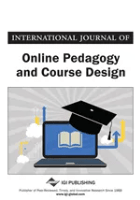
International Journal of Online Pedagogy and Course Design
Advancing research in digital pedagogy.The International Journal of Online Pedagogy and Course Design, published by IGI Global, serves as a vital resource for researchers, educators, and practitioners interested in the integration of technology in education. Since its inception in 2017, this journal has focused on the latest advancements in online teaching methodologies, course design, and assessment frameworks, contributing to the dynamic field of educational technology. It is indexed in Scopus and currently ranks Q4 in the Education category, reflecting its growing influence within the academic community. The journal provides an invaluable platform for sharing innovative research and practical insights that enhance online learning experiences, crucial in today’s digitally-driven educational landscape. With an ISSN of 2155-6873 and E-ISSN of 2155-6881, the journal is dedicated to fostering a collaborative environment where ideas and practices in online pedagogy can thrive.
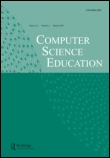
Computer Science Education
Transforming Learning Outcomes in the Digital AgeComputer Science Education is a prestigious journal published by ROUTLEDGE JOURNALS, TAYLOR & FRANCIS LTD, focusing on the critical intersection of computer science and educational practices. Established in 1988, this journal has become a cornerstone for researchers, educators, and practitioners interested in enhancing teaching methodologies and learning outcomes in computer science. With an impressive ranking within the top quartile (Q1) in both Computer Science (miscellaneous) and Education categories for 2023, as well as high Scopus percentile placements, it underscores its significance in advancing the discipline. The journal offers a platform for innovative research encompassing diverse educational environments and approaches, and while it currently does not offer open access options, it remains committed to disseminating high-quality scholarly work. As a vital resource for anyone looking to contribute to and understand the evolving landscape of computer science education, Computer Science Education continues to shape the future of learning in this dynamic field.
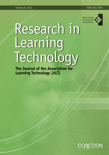
Research in Learning Technology
Fostering Global Collaboration in Learning Technology ResearchResearch in Learning Technology, published by the Association for Learning Technology (ALT)impact factor, the journal has consistently ranked in the top quartiles of both the Education (Q1) and Computer Science Applications (Q2) categories as of 2023, highlighting its significance and influence in the academic community. The journal is committed to disseminating high-quality research and practical insights that bridge the gap between technology and pedagogy, making it an essential resource for researchers, educators, and practitioners alike. The Scopus rankings further emphasize its reputation, placing it in the top 10% of social sciences education journals. As an open-access journal, Research in Learning Technology ensures that its valuable content is freely accessible, empowering a global audience to drive innovation in learning technology. Whether you are a seasoned researcher or a student exploring this dynamic field, this journal serves as a vital platform for sharing knowledge and advancing the discourse in learning technologies.

Smart Learning Environments
Advancing smart technologies for enhanced learning experiences.Smart Learning Environments, published by Springer Heidelberg, is a leading open-access journal dedicated to advancing the field of educational technology and intelligent learning systems. Since its inception in 2014, this journal has established itself as a vital resource for researchers and practitioners, showcasing innovative interdisciplinary approaches that enhance learning experiences using smart technologies. With a notable impact factor and recognition in the top quartiles (Q1) of both Computer Science Applications and Education, it ranks within the top 2% of journals in the Social Sciences – Education category and the top 7% in Computer Science, according to Scopus. The journal's scope encompasses empirical studies, theoretical papers, and reviews, making it an essential platform for disseminating cutting-edge research. Researchers, educators, and technology professionals are encouraged to engage with this premier outlet, which not only facilitates access to high-quality research but also promotes collaboration across academic and professional spheres.
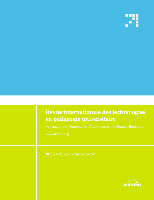
International Journal of Technologies in Higher Education
Fostering Innovation in Academic Learning EnvironmentsInternational Journal of Technologies in Higher Education, with ISSN 1708-7570 and E-ISSN 1708-7570, is a distinguished academic platform dedicated to advancing the intersection of technology and pedagogy in higher education. Published by INT JOURNAL TECHNOLOGIES HIGHER EDUCATION, this open-access journal has been at the forefront of educational innovation since 2004, providing researchers, practitioners, and students access to high-quality research without financial barriers. The journal aims to disseminate cutting-edge studies, best practices, and theoretical insights that explore the transformative impact of emerging technologies in the field of education. Situated in Montreal, Canada, the journal serves as a pivotal resource for those committed to enhancing learning environments through technological advancements. By fostering scholarly discussion and collaboration, the International Journal of Technologies in Higher Education plays an essential role in shaping the future of educational practices globally.
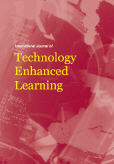
International Journal of Technology Enhanced Learning
Exploring New Frontiers in Technology-Enhanced EducationInternational Journal of Technology Enhanced Learning, published by INDERSCIENCE ENTERPRISES LTD, is a premier scholarly journal that comprehensively explores the intersection of technology and education, fostering innovative approaches to enhance learning processes. Established in 2008 and continuing through 2024, the journal is pivotal for researchers, educators, and technology professionals aiming to disseminate and engage with cutting-edge developments in technology-enhanced learning environments. With an admirable ranking in Scopus—placing in the 72nd percentile of Education and 49th in Computer Science Applications—the journal reflects a robust influence in the fields of Computer Science Applications and Education, as evidenced by its Q2 and Q3 quartile rankings. The journal not only provides a platform for empirical research and theoretical discourse but also emphasizes practical implementations in e-learning. Although it does not offer open access, its curated collection of articles serves as a vital resource for scholars and practitioners who are dedicated to advancing the nexus of technology and education.

ETR&D-EDUCATIONAL TECHNOLOGY RESEARCH AND DEVELOPMENT
Driving Educational Excellence in a Digital AgeETR&D - Educational Technology Research and Development, published by Springer, is a premier journal dedicated to advancing the field of educational technology through rigorous research and development. With a history dating back to 1957, it has established itself as a leading resource for scholars and practitioners, maintaining a remarkable Q1 ranking in Education as of 2023, and standing at an impressive 41st out of 1543 in the Scopus rankings for Social Sciences - Education, placing it in the 97th percentile. This journal aims to bridge the gap between theory and practice, offering in-depth insights into the latest innovations and methodologies in educational technology. As a vital resource for researchers, educators, and technology developers, ETR&D highlights the interplay of technology, pedagogy, and learning environments, driving the evolution of educational practices in a digital era. Although not an open access journal, it provides comprehensive access options for institutional and individual subscribers, ensuring that key findings reach a broad audience. Discover the future of education through ETR&D's influential publications.

Malaysian Journal of Learning & Instruction
Transforming educational practices with groundbreaking findings.Welcome to the Malaysian Journal of Learning & Instruction, a prestigious open-access journal published by UNIV UTARA MALAYSIA PRESS since 2004. With a focus on advancing knowledge in the fields of education, cultural studies, and psychology, this journal serves as a vital platform for researchers, educators, and professionals to share innovative findings that address contemporary challenges in learning and instructional practices. The journal has gained recognition within the academic community, proudly achieving a Q1 ranking in Cultural Studies and a Q2 ranking in Education as of 2023, reflecting its commitment to high-quality research. Furthermore, with an impressive 94th percentile ranking in Social Sciences—Cultural Studies, it stands as a leader in fostering impactful scholarship. Researchers interested in the intersection of educational psychology and cultural discourse will find this journal to be an invaluable resource. Join us in exploring groundbreaking insights that shape the future of education and instruction.

Medical Science Educator
Bridging gaps in medical science and educational excellence.Medical Science Educator, published by SpringerNature, is an esteemed journal committed to advancing the intersection of educational methodologies and medical science. With a significant impact in its field, this journal holds a Q2 ranking in both Education and Medicine (miscellaneous) categories as of 2023, reflecting its dedication to high-quality research and scholarly dialogue. Operating in a digital format, the journal uniquely facilitates access to pivotal studies from its inception in 2011 until 2024, fostering innovation in medical education. The latest rankings highlight its credibility, placing it at the 63rd percentile in Social Sciences - Education and the 56th percentile in Medicine - Medicine (miscellaneous) within Scopus. This platform serves as an invaluable resource for educators, researchers, and practitioners aiming to enhance teaching practices and shape the future of medical education.